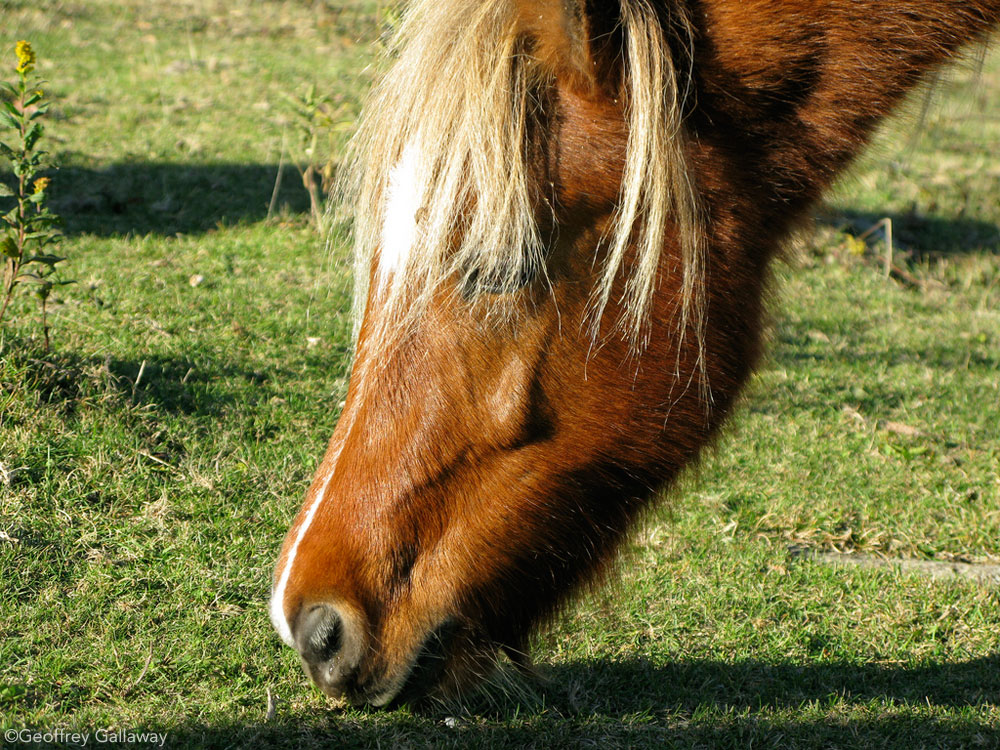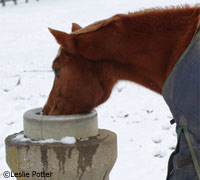
Even horses kept with exactly the same lifestyle can have extremely different parasite loads. A Fecal Egg Count will determine which horses you should be focusing your deworming efforts on.
Internal parasites (aka “worms”) attack horses of all ages, causing a variety of problems ranging from poor physical condition and stunted growth to colic. Paradoxically, some horses show few, if any, signs of internal parasite infestation until they experience an acute—and possibly life-threatening—health crisis.
Of the many different types of equine internal parasites, the most important are large strongyles (Strongylus vulgaris, Strongylus edentatus and Strongylus equinus), small strongyles (cyathostomes), roundworms (Parascaris spp.) and tapeworms (Anoplocephala magna, A. perfoliata and Paranoplocephala mamillana).
Does Your Horse Have Worms?
It’s not always easy to tell if your horse has worms. Some of the diagnostic methods used, with varying degrees of success, include:
- Observation of poor physical condition (rough hair coat, pot-bellied appearance, weight loss). Although some horse owners claim they can tell if their horse has worms just by looking, this diagnostic method is nothing more than a guess. Many horses with worms, especially adults, have no visible change in condition. Poor condition can stem from lots of other problems as well—inadequate feed, illness or even stress.
- Looking for worms in the manure. Unfortunately, most worms aren’t visible in the manure, with the possible exception of roundworms (large white worms usually seen after deworming) and small strongyle larvae (small red worms). If you do see worms in the manure, you can be sure that your horse is infected. However, he could also have other worms that don’t show up in those piles.
- Fecal flotation. When your veterinarian finds parasite eggs in a fecal flotation test, it’s proof that your horse has parasites. What that positive result doesn’t reveal is the severity of the infestation; were the eggs produced by a few adults or a few hundred? A negative fecal flotation can also be misleading: If eggs aren’t found, your horse might be parasite-free, or it could mean the parasites just aren’t currently producing eggs. Since the fecal flotation test only indicates the parasites that are present and not the severity of the infestation, horses with low-level parasite loads may receive unnecessary medication. A fecal flotation test also won’t tell you if your deworming medication has effectively reduced the parasite load.
- Fecal egg count (FEC). This test is the most informative diagnostic method because it determines the number of parasite eggs per gram of fecal matter. This tells your veterinarian what parasites are involved and the severity of infestation. Fecal egg counts are also used in fecal egg count reduction testing (FECRT), which determines the effectiveness of a deworming program. A negative FEC can be misleading for the same reasons described for a negative fecal flotation test.
Dewormers
The most commonly used equine dewormers are the macrocyclic lactones (ivermectin, moxidectin), the benzimidazoles (fenbendazole, oxibendazole) and the tetrahydropyrimidines (pyrantel). Most of these compounds are effective against several different parasites. Some, such as ivermectin and moxidectin, kill migrating and dormant larvae as well as adults.
Unfortunately, internal parasites are masters at adapting to survive, so the more frequently they’re exposed to a particular type of deworming chemical, the more likely they are to develop resistance to it. When that occurs, that dewormer will no longer be effective against that parasite. The lack of new types of deworming compounds, coupled with increased use of existing products, makes the development of parasite resistance a real risk.
Deworming Programs to Fight Resistance
Concern about parasite resistance has led to changes in recommendations regarding deworming programs for horses. The goal is no longer total elimination of internal parasites but rather reduction of the parasite load to a level that avoids health problems, acknowledging that some horses may never be completely parasite-free.
A deworming program based on FEC testing provides optimal parasite control while minimizing the potential for resistance development. With this program, the dewormer is administered only when the FEC rises above a certain level. Horses don’t receive dewormer unless they actually need it. Fecal egg count reduction testing is used after deworming to monitor the effectiveness of the treatment. If there’s a 90 percent reduction in the FEC, the treatment was successful; an 80 percent reduction means the treatment was only marginally successful. If the reduction is less than 80 percent, the treatment was unsuccessful and you’ll need to re-treat with a different type of dewormer.
Management Tactics
Controlling internal parasites requires good management as well as medication. To minimize your horse’s exposure to the freeloaders, consider these tactics:
- Place hay and grain in a feeder, not on the ground where it may end up mixing with manure.
- Clean up manure in paddocks and pastures at least twice a week.
- Compost manure instead of spreading it on pastures where horses graze.
- Minimize the number of horses per acre of pasture to prevent overgrazing and reduce contamination with parasite eggs and larvae.
- Rotate pastures to avoid overgrazing. If possible, rotate with cattle or sheep to break the life cycle of the equine parasites.
- Mow and harrow pastures during hot, dry weather to break up manure piles and expose them to sunlight, heat and drying, which will help kill parasite eggs and larvae. Only do this if you are able to keep horses off of the pasture for 2-4 weeks afterwards.
- Minimize parasite exposure in foals and weanlings by keeping them separate from yearlings and older horses.





Instead of continuing to pump horses with poisons that are likely to fail eventually anyways, why not look into safer, more effective means of controlling parasites, such as diatomaceous earth, garlic, etc.?
Oh, I know…maybe because the deworming drug companies wouldn’t make as much money?
good info- reinforced what I learned in Into to parasites
I agree with B 100%!!!
good information
I agree with B as well!! there has to be a better way to control parasites, this should be a matter of what’s best for the horses, not money!